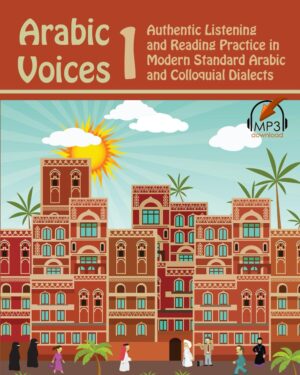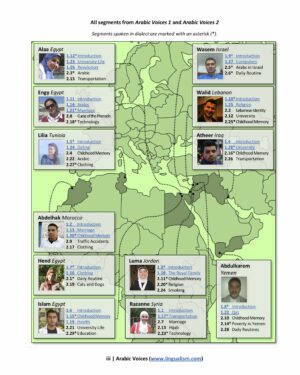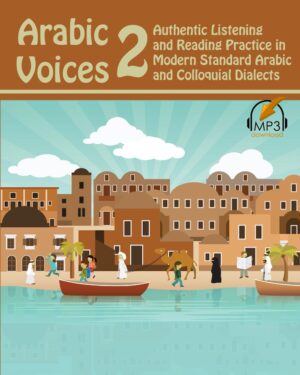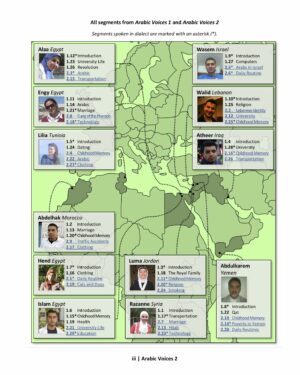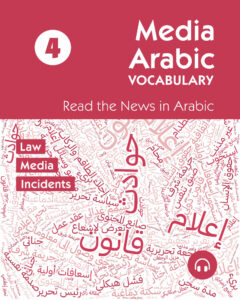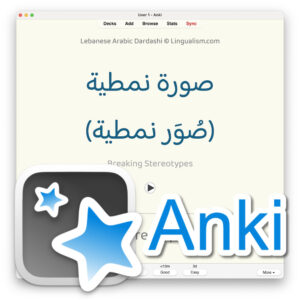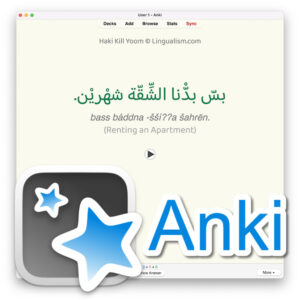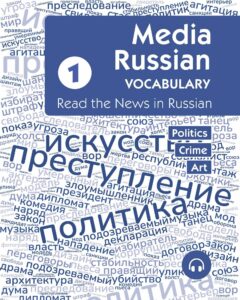Home » Modern Standard Arabic » Religion in Lebanon–Walid
Religion in Lebanon–Walid
| Greetings and welcome! [00:00] | السلام عليكم ورحمة الله وبركاته. أهلاً ومرحبًا بكم. | |
| Today we will talk about what Walid said about the religious life in Lebanon, and we will comment on what various words and terms he used. [00:05] | اليوم سنتحدّث عمّا قاله وليد بشأن الحياة الدينية في لبنان، وسنقوم بالتعليق على ما استخدمه من كلماتٍ ومصطلحاتٍ مختلفة. | |
| We start on page 45, specifically on line 1. [00:15] | فنبدأ في الصفحة المائة خمس وأربعون، وتحديدًا في السطر الأول. | |
| Waleed says, "What... what I will talk about today is one of the most difficult issues currently being discussed in my country." [00:20] | يقول وليد: (ما سا... ما سأتكلم عنه اليوم هو من أصعب المواضيع المطروحة في بلدي حاليًا). | |
| Walid uses a word مطروح (cast) here with the word موضوع (subject). [00:30] | فيستخدم وليد هنا كلمة [مطروح] مع كلمة [موضوع]. | |
| We often use these two words together and say, "This topic is cast upon you." Any discussion, you can discuss it. [00:34] | وغالبًا ما نستخدم هاتين الكلمتين معًا فنقول: (هذا الموضوع مطروحٌ عليك) أي مطروحٌ للمناقشة، فيمكنك مناقشته. | |
| The topics raised are topics that people often talk about, so… This topic is brought up in Lebanon, meaning that many people talk about this topic. [00:46] | المواضيع المطروحة هي مواضيع كثيرًا ما يتحدّث بشأنها الناس فـ… هذا الموضوع مطروح في لبنان، أي أن كثيرًا من الناس يتحدّثون بشأن هذا الموضوع. | |
| We see here that Walid did not use the word مطروح للمناقشة because this can be derived from the context, saying, "This subject is cast," that is, 'up for discussion.' [01:01] | ونرى هنا أن وليد لم يستخدم كلمة [مطروح للمناقشة]، لأن هذا مُستنتج من سياق الحديث فتقول: (هذا الموضوع مطروح) أي مطروح للمناقشة. | |
| You can say 'up for discussion' or just 'up for it/cast.' That is, it is up for discussion. We can deduce this from the context of the talk. [01:15] | يمكنك أن تقول [مطروح للمناقشة] أو فقط [مطروح] أي هو مطروح للمناقشة، فيمكننا استنتاج هذا من سياق الحديث. | |
| Great! Then we move on to line 5. Walid says, "Lebanon is distinguished from the rest of its neighbors by the diversity of its religions." He uses the verb يتميز ( is distinguished), [01:26] | عظيم! ننتقل بعد ذلك إلى السطر الخامس—ويقول وليد: (يتميز لبنان عن باقي الدول المجاورة له بتنوع الأديان الموجودة فيه) ويستخدم الفعل [يتميز]، | |
| and when the verb is used, you can use the preposition بـ after it to mention the feature. [01:43] | وعندما تستخدم الفعل [يتميز]، يمكنك استخدام حرف [الباء] بعده لذكر الميزة أو الصفة. | |
| Walid says here, "Lebanon is distinguished by the diversity of religions," so he uses the preposition بـ to mention the feature. [01:52] | فيقول وليد هنا: (يتميز لبنان بتنوع الأديان) فيستخدم حرف [الباء] لذكر الميزة. | |
| You can say for example, "This book is characterized by ease; this building is characterized by a large area." And you mention the feature after the preposition: يتميز بـ. [02:04] | يمكنك أن تقول مثلًا: (يتميز هذا الكتاب بسهولته، يتميز هذا البناء في مساحته الكبيرة) فتذكر الميزة بعد حرف الباء [يتميز بـ]. | |
| Great! We then move on to line 9. Walid says, "Since ancient times, this variety has been present in Lebanon." And he uses the phrase منذ القدم (since ancient times). This phrase indicates that something happened a long time ago. [02:23] | عظيم! ننتقل بعد ذلك إلى السطر التاسع—ويقول وليد: (منذ القدم هذا التنوع موجود في لبنان) فيستخدم عبارة [منذ القدم] وهذه العبارة تشير إلى أن أمرًا ما قد حدث منذ زمنٍ بعيد أو منذ زمنٍ مضى. | |
| You can say, for example, "Egyptian civilization has been known since ancient times."... A long time ago. [02:49] | فيمكنك أن تقول مثلًا: (الحضارة المصرية معروفة منذ القدم) أي منذ زمن... منذ زمنٍ بعيد. | |
| منذ القدم and منذ زمنٍ بعيد, you can use to indicate that something happened in the past. [03:00] | [منذ القدم، منذ زمنٍ بعيد] يمكنك استخدامها للإشارة إلى أن أمرًا ما قد حدث منذ فترة زمنية ماضية، [منذ القدم]. | |
| Great! Then we move to line 10. Walid says, "So, in some cities and villages, we may find the mosque and the church in the same place." And here, Waliduses قد (may(be)) before an imperfect verb. [03:15] | عظيم! بعد ذلك ننتقل إلى السطر العاشر- فيقول وليد (لذا في بعض المدن والقرى قد نجد المسجد والكنيسة في نفس المكان) وهنا يستخدم وليد [قد] قبل [الفعل المضارع]. | |
| He says, "We may find the mosque." And when you use قد before the imperfect tense, this indicates the possibility of something happening. We may find the mosque and the church in the same place. [03:33] | فيقول: (قد نجد المسجد) وعندما تستخدم [قد] قبل [الفعل المضارع] فهذا يشير إلى إمكانية حدوث أمرٍ ما، (قد نجد المسجد والكنيسة في نفس المكان) | |
| So, this is a possible thing, but it is not necessarily something that will happen; this is only a possible thing. [03:48] | فهذا أمرٌ ممكن، ولكنه ليس بالضروري أمر سيحدث، هذا فقط أمرٌ ممكن. | |
| You can say, for example, "I may meet up with my friend today." This means that you may meet him or may not meet him. [03:56] | فيمكنك أن تقول مثلًا (أنا قد أقابل صديقي اليوم) فهذا يعني أنك قد تقابله وقد لا تقابله. | |
| The word قد precedes the imperfect verb and gives the meaning of possibility and not the necessity to happen. [04:06] | فكلمة [قد] عندما تسبق [الفعل المضارع] فهي تُعطي معنى الإمكانية وليس ضرورة حدوث الأمر. | |
| "I might study today." Maybe you study, and maybe you won't study. The particle, or word, قد means that one of the things can happen. [04:17] | (قد أذاكر اليوم) فربما قد تذاكر وربما لن تذاكر، فحرف أو كلمة [قد] تعني إمكانية حدوث أحد الأمرين. | |
| But if you have already ... if قد precedes a past tense verb, then this means definiteness, that is, the matter has already happened. [04:30] | ولكن إن سبق قد حرف... إن سبق [قد] الفعل الماضي فهذا يعني التحقيق أي أن الأمر حدث بالفعل | |
| For example, if I say, "I met my friend" in the past, then this means that I have already met him, and here it means definitely. I have studied this lesson–meaning that I have already studied this lesson. There is no doubt about it. [04:43] | فمثلًا إن قلت: (أنا قد قابلت صديقي) في الماضي فهذا يعني أنني قد قابلته فعلًا، وقد هنا تعني التحقيق (أنا قد ذاكرت هذا الدرس) أي أنني بالفعل قد ذاكرت هذا الدرس، وليس هناك شك في ذلك. | |
| If قد precedes an imperfect verb, it implies possibility; but if it precedes a past tense verb, it implies definiteness. [05:06] | فإذا سبقت [قد] الفعل المضارع فهذا يعني [الإمكانية]؛ ولكن إن سبقت الفعل الماضي فهذا يعني [التحقيق]. | |
| Great! We then move to line 12. Walid says, "They did not know the difference between a Muslim and a Christian until the outbreak of the civil war in Lebanon at the beginning of 1975." [05:18] | عظيم! ننتقل بعد ذلك إلى السطر الثاني عشر- يقول وليد: (ولم يعرفوا الفرق بين مسلمٍ ومسيحي إلى وقوع الحرب الأهلية في لبنان مطلع العام 1975). | |
| Walid says that the civil war was in Lebanon, or occurred in Lebanon, in early 1975, and uses the word مطلع (early) with العام (the year). [05:35] | وهنا يقول وليد أن الحرب الأهلية كانت في لبنان أو حدثت في لبنان في مطلع العام 1975، ويستخدم كلمة [مطلع] مع [العام]. | |
| The word مطلع,when used at the beginning of a period of time, means the beginning of this period: early 1900. [05:49] | وكلمة [مطلع] عندما تُستخدم في بداية مدة زمنية فهي تعني بداية هذه المدة الزمنية (مطلع العام 1900). | |
| You can also say 'the turn of the century,' that is, the beginning of the century. 'Early in the year' is the beginning of the year. 'The beginning of the century.' [05:58] | يمكنك كذلك أن تقول (مطلع القرن) ومطلع القرن أي بداية القرن؛ (مطلع العام) بداية العام، (مطلع القرن) بداية القرن. | |
| Then we turn to line 19. "But we must draw attention to the truth hidden in the hearts of all Lebanese who reject any religious fanaticism." [06:10] | ثم ننتقل بعد ذلك إلى السطر التاسع عشر—يقول وليد: (لكن لا بدّ من لفت النظر إلى الحقيقة المخبأة في نفوس جميع اللبنانيين الرافضين لأي تعصب ديني). | |
| Here, Walid uses the wo... or a phrase.... Walid here uses the phrase لفت النظر (drawing attention), to indicate that some people do not know something, and he wants to make them aware of this matter, so he says 'to draw attention.' [06:26] | ويستخدم وليد هنا ك... أو عبارة…. ويستخدم وليد هنا عبارة [لفت النظر]، للإشارة إلى أن بعض الأشخاص لا يدرون أمرًا ما، وهو يريد أن يجعلهم على دراية بهذا الأمر، فيقول [لفت النظر]. | |
| The phrase [gesture] means that someone is not aware of a certain thing, and you want to realize this thing and say, "I drew attention to this." [06:47] | فعبارة [لفت النظر] تعني أن أحدًا ما لا يدرك شيئًأ معينًا، وأنت تريده أن يدرك هذا الشيء فتقول: (أنا ألفت نظره لهذا الأمر). | |
| "I would like to draw your attention to the importance of Arabic..." which means, for example, ... Whoever I am speaking to does not know the importance of the Arabic language, and I would like to draw this person's attention to the importance of the Arabic language. [07:03] | (أنا أود أن ألفت نظرك إلى أهمية اللغة العربية) وهذا يعني أن مثلًا م... من أتحدّث إليه لا يعرف أهمية اللغة العربية، وأنا أود أن ألفت نظر هذا الشخص لأهمية اللغة العربية، [تلفت النظر]. | |
| You can also use the word الانتباه (attention) instead of النظر. He says, "But it is necessary to draw attention to the truth hidden in the souls of all Lebanese who reject any religious fanaticism." 'draw someone's attention.' It means to make them aware of something. [07:21] | يمكنك كذلك أن تستخدم كلمة [الانتباه] بدلًا من [النظر]—تقول: (لكن لا بدّ من لفت الانتباه إلى الحقيقة المخبأة في نفوس جميع اللبنانيين الرافضين لأي تعصبٍ ديني) فتلفت نظر شخصٍ ما، أو تلفت انتباه، أو تلفت انتباهه؛ معناه أن تجعلهم على دراية بأمرٍ معين. | |
| I would like to draw your attention to the importance of these videos accompanying Arabic Voices. [07:46] | وأنا أود أن ألفت انتباهكم إلى أهمية هذه الفيديوهات التي تصاحب كتاب Arabic Voices. | |
| At the end of our conversation today, thank you very much and I hope that ... [07:55] | في نهاية حديثنا اليوم أشكركم شكرًا جزيلًا وأتمنى أن... | |
| I hope you have benefited from this video. [08:00] | وأتمنى أن تكونوا قد استفدتم من هذا الفيديو. | |
| See you in another video, God willing. May peace and God's mercy and blessings be upon you. [08:04] | ألقاكم على خير في فيديو آخر إن شاء الله، والسلام عليكم ورحمة الله وبركاته. |
Video Lessons
Arabic Voices MSA Lessons
Arabic teacher Mostafa Ahmed takes us through segments in MSA from Lingualism's book Arabic Voices 1: Authentic Listening and Reading Practice in Modern Standard Arabic and Colloquial Dialects, explaining interesting points of grammar and vocabulary.

